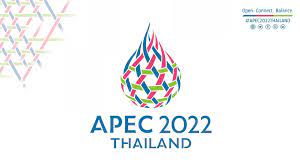The 21 Asia-Pacific economies will gather in Bangkok on Friday and Saturday for another crucial multilateral event
Article by Francesco Mattogno
Southeast Asia: Round 2. After the ASEAN summit in Phnom Penh, the month of diplomatic appointments in the region comes into full swing. Opening and closing the second week of summits will be the Asia-Pacific Economic Cooperation (APEC) leaders' meeting in Bangkok, Thailand, from 14 to 19 November. A series of meetings that for two days will coincide with the G20 in Indonesia (15-16 November).
In an armoured Bangkok, the world's greats will try to leave politics aside to focus on 'free and open' trade and investment. That is, the glue that holds together the 21 economies of APEC, which includes China, the United States and Russia, among others. All members aggregated together are worth about 60 per cent of GDP and 50 per cent of world trade.
That politics should stay out of the summit, however, is unrealistic. The fine resolutions for mutually beneficial regional economic integration and cooperation (to which the birth of APEC in 1989 is owed) have been cracking for some time now, cracked mainly by threats of decoupling between Washington and Beijing. The war in Ukraine only threatens to give them the coup de grace. Thailand's 2022 presidency, which started out with slogans of openness and connection on a Bio-Circular-Green (BCG) economic model, has been particularly affected. When Moscow invaded Kiev.
At the APEC trade ministers' summit in May, representatives of the US, Japan, Australia, Canada and New Zealand left the room in protest once Russian Economy Minister Maxim Reshetnikov took the floor. The meeting ended without a joint statement and the same fate befell the October finance ministers' meeting. At the end of the summit, the five countries - joined by South Korea and Chile - expressed 'grave concerns about the war in Ukraine'.
The political language, unusual for an economic summit, caused some internal unease within the group. Thai Prime Minister Prayut Chan-o-cha spoke of a 'critical juncture' for APEC, not unjustly. To the focus on supply chains, resumption of post-covid inter-regional travel and food security that Bangkok wanted to focus on, the pressing issues of inflation and energy security were added to the top of the list.
So much so that external invitees to the summit (besides Macron, for example) include Mohammad bin Salman, Crown Prince of Saudi Arabia. His presence makes it likely that oil ties between South-East Asia and Riyadh will be strengthened, much to the chagrin of BCG and environmental sustainability. As for the chief guests, however, seven of the 21 APEC economies will not be represented by their leaders. And two are particularly conspicuous absences.
Both US President Joe Biden and Russian President Vladimir Putin chose to skip the summit. But if Putin is engaged in a war that is not going as he would have imagined, Biden will fly from the G20 in Bali directly to the White House for his niece's wedding. An explanation that has somewhat embarrassed both Thailand and the US itself, which will send Vice President Kamala Harris in his place. Also missing will be the number ones from Mexico, Malaysia, South Korea and Taiwan (for which TSMC founder Morris Chang will attend). Taipei, as well as Hong Kong, can be part of APEC without irritating Beijing precisely because the group encompasses 'economies' and not 'states'.
Chinese President Xi Jinping, who is visiting Thailand from 17 to 19 November, is ready to take advantage of the vacuum left by Biden. The absence of an American counterweight will guarantee him an exclusive welcome. According to the Bangkok Post, Prayut changed the schedule of the event only to schedule an official dinner between the two and allow Xi to attend the royal audience of leaders. From a practical point of view, the general secretary of the CCP is likely to reassure business partners that the People's Republic is still open for business - as reiterated during a forum in Beijing on 2 November -, trying to dispel concerns about the low growth rate of the Chinese economy. A face-to-face meeting with Japanese Prime Minister Fumio Kishida is also possible.
One wonders then how much influence Kamala Harris will have. The willingness to 'deepen ties with APEC countries' expressed by Biden at the 2021 summit was followed by the launch in May of the Indo-Pacific Economic Initiative (IPEF, criticised for its vagueness) and the announcement that the US will hold the 2023 APEC chairmanship. In October, US Deputy Treasury Secretary Wally Adeyemo met with some of the group's finance ministers in order to demonstrate that the region is indeed a 'top priority' for Washington. But these efforts are likely to prove ineffective. The president's absence from the summit alone could be enough to deem the US economic commitment to the area still insufficient.
For Bangkok, which has also been hit by internal political turmoil related to Prayut (speculation says that parliament may be dissolved at the end of the summit), balancing differences and easing tensions will not be easy. The minimum objective is that the events of May are not repeated and that a joint final declaration is reached: thus, avoiding a failure of the summit. Then Thailand will pass the APEC ball to the United States, bringing the curtain down on the month that put South-East Asia at the centre of international relations.






